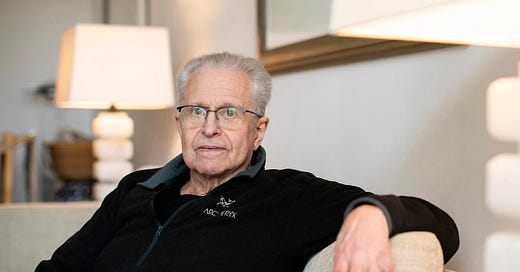Why Larry Tribe expects “blood in the streets”
Overturning Roe v. Wade could be just the beginning. Find out why one of the country's foremost constitutional law scholars thinks America may be close to a kind of civil war.
Over the past week, Unprecedented spoke to several top constitutional law scholars to determine what the Supreme Court might make of a federal law on abortion — either one that bans it nationwide, or one that codifies Roe v. Wade and other constitutional protections into law.
The consensus was that whether the Supreme Court upholds the law might depend less on the justices’ understanding of the Constitution, and more on their individual policy preferences.
Harvard Law Professor Emeritus Laurence Tribe, in particular, was troubled by what he perceives as a double standard that could lead to the justices approving a national ban on abortion, but striking down codification of abortion rights — even though both legislative attempts would likely be based on, as Tribe put it, “essentially identical exercises of the commerce power.”
“So what we now confront,” Tribe told Unprecedented, “is a horizon with a kind of double standard for what the commerce power would let Congress achieve, and with a fairly clear outcome — unless the composition of the court is changed — that abortion will not be legal in America, even in the blue states, unless the Democrats hold on to the House and hold on to the Senate.”
In this lightly edited transcript, I pressed Tribe on why he no longer has faith in an institution to which he’s devoted so much of his life studying.
Matthew Schwartz: You sound jaded, professor.
Larry Tribe: It's taken me 50 years to get here, but I'm simply being realistic. I have never never read the tea leaves of the Supreme Court to accord with my own ideal beliefs. When the court was quite conservative, I figured out lots of ways to win victories there. But I see the handwriting on the wall, and I think it's not really being jaded or cynical; it's a matter of realism.
When you look at what the court did in the Bruen case about guns, how it expanded Heller; how it wiped away Roe v. Wade without giving really any reasons other than “We have the votes, there are five of us, we think the decision was completely wrong”; and what it did in the case of West Virginia v. EPA — when you add all of those things, it's just quite clear that this is where the Supreme Court is. And having spent a year studying the court even more intensively than I had in my 50 year career here as a member of the president's commission on the Supreme Court of the United States, I have a pretty firm view about these things, and it is what it is.
Schwartz: What does that mean for the legitimacy of the court going forward?
Tribe: I think it undermines its legitimacy overwhelmingly. I really fear that we need an independent Supreme Court. We need one that people can respect even when they disagree with its opinions. Having argued the first of the two Bush v. Gore cases and having ultimately seen that case go in a way that I thought was wrong, I nonetheless was willing to live with it, respected it, regarded it as a mistake. But fewer and fewer people are going to be in that camp, I think, in the future.
The fact that only something like 25% of the people have a favorable view of the court now is rather frightening. And I do think that however misguided the court is, there are many cases that don't fall within the court's political agenda, in which the court is not divided in quite as partisan a way. And yet the public is likely to make very few distinctions whenever the court renders any decision about anything. Even if, you know, Gorsuch lines up with some of the liberals, as he does in the cases involving Indian rights, or as he did when he wrote the Bostock opinion, dealing with trans people; or even when Kagan lines up with the conservatives. Even when, in other words, it is not politicians in robes, that's how they'll be seen.
And the price that the country will pay is even more important than the price that the court will pay. Because I think the country needs an independent third branch that can be a guardrail against rogue action by the other two political branches. And I'm hoping that it won't come to chaos and blood in the streets, but that's what happens when a nation loses a court that it has respect for. So I think the combination of the dangers that await us in the 2024 election — with the detailed plans that the Trump people are willing to seize the presidency, whether they win it or not, by using, among other things, this completely misleadingly named “independent state legislature” theory — I think that we're in for a very rough ride.
Schwartz: When you say “blood in the streets,” are you speaking metaphorically?
Tribe: No. No, I'm speaking about Uvalde and Chicago and Sandy Hook and Buffalo. We are awash in very high powered military weapons — military style weapons. The Proud Boys and the Oath Keepers and other paramilitary groups are armed to the teeth. And I'm afraid there will be violence, a great deal of violence.
And I hate the thought. I'm not a pacifist, but I hate the thought of the country being ripped apart that way and lots of innocent people dying. I just don't see any clear way out unless millions of people who otherwise wouldn't vote become energized by this terrifying prospect and tell themselves, whether they are right-leaning or left-leaning: This is not the country that we want our children to grow up in — or our grandkids, and vote like crazy in large numbers in November to not have the Republicans — who are no longer, I think, a democracy-respecting political party — make sure that they don't take over everything this November.
I believe we need two viable political parties, a conservative one and a liberal one, but right now, we have only one political party that seems to have any respect for the rules, and any regard for democracy. And I think that's an existential threat to the survival of our democracy.
Schwartz: I don't want to be too pragmatic and looking on the bright side, but if it is the other side — if it is the side with the guns that that seizes power — and if they have all the guns, then wouldn't that limit the likelihood of blood in the streets? Because they're the ones shooting.
Tribe: Well, I just don't know what'll happen. I don't think that liberals are going to take this lying down. I think a number of them will decide that they’d better be armed as well. I really don't think that it's going to be sort of a one-sided slaughter; there will be a lot of of life lost needlessly and tragically.
Schwartz: It seems like you're you're dancing around the phrase “civil war.” Am I being too alarmist?
Tribe: Well, I mean, there’s a recent book suggesting that we're likely to have another civil war. I think the structure is a little different. It's not quite the way it was in the 1860s with identifiable states on one side and the other. There are red states and there are blue states, but really there are lots of blue urban areas inside the red states, so it's a different kind of conflict. But it has some of the features of civil war. I don't want to call it a civil war because I think that really requires two kind of coherent sides that line up along predictable geographic battle lines. And here I see something much more disparate and non-dichotomous.
Schwartz: Our conversation has taken a bit of a broader dimension than I expected — and a terrifying one.
Tribe: Yeah, no I hadn't intended to, and I hadn't intended to spoil your day. But I figured anybody writing about this stuff, if I'm at all close to right that we're really at an inflection point — and Judge Luttig, for for one, just happens to agree with me and he's very much to my right: he just tweeted his agreement with what I wrote about the the dangers of this independent state legislature theory. I think the situation is sufficiently perilous that anyone who's writing about things related to this really needs to address the broader question, and not only the question — broad and deep as it is — of what the future of Roe v. Wade will be on the national scene.
Schwartz: All right, Professor Tribe, thank you so much for your your thoughts. I wish I could say it was a delight to talk to you, but...
Tribe: (laughing) I know. Yeah, if you said that, I would think, Maybe he didn't understand what I was saying.



